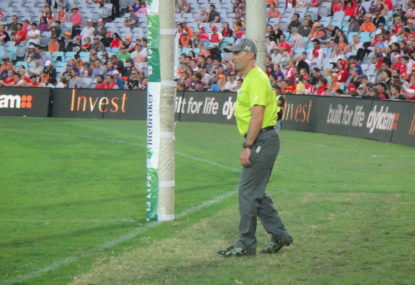Former St Kilda player jailed for five years over drug trafficking charges
Former St Kilda player Sam Fisher has received a jail sentence of five years and four months over drug trafficking and drug possession. The…

As a converted AFL fan of some 24 years, I have bellowed countless times in the stands for the deliberate out of bounds free kick to be paid in a match. Too often my calls were in vain.
Having come from a Sydney rugby union background, the deliberate seemed a simple enough rule to follow.
A player intentionally aims a kick or runs the ball out, and the opposition should be a paid a free kick, right?
How wrong I was!
As a result, I was hooked on the rule (and its associated lack of adjudication), and my loudest cheers in a match were not for a Plugger goal or a Paul Kelly tackle, but for whenever this rule came out once or twice a season (my mates did suggest therapy).
Paul Roos came to the Swans and fashioned his role at centre-half-back – driving the ball 40 to 50 metres from the defensive 50 pockets to the wide wings of the SCG, generally dribbling the ball out of bounds.
“Deliberate!” I should have bellowed.
But the rugby instincts kicked in. Not deliberate at all, but a stroke of genius as he found touch with a significant gain to set up the next stoppage.
In fact, the Swans turned into master exploiters in extrapolating the non-decision from the umpires for years, embracing these non-calls as a key component of their successful 2000s stoppage strategies.
Roos then took this further as a coach and, with Jason Ball, Darren Jolly and Shane Mumford, boundary stoppages began to imitate intricate line-outs and the stoppage set piece became a part of the AFL vernacular, and crucial to the Swans success.
Fast forward to 2016, and the umpires have been instructed to focus on ‘intent’ this year (ironically that is the rule). I do feel sorry for some players, as the boundary line is now no longer your proverbial friend.
Heath Grundy has been caught out a few times this year – but it seems a bit harsh to penalise a player for a shank.
In modern footy, I find paying a mark for kicking it backwards to be more reprehensible than a 60-metre kick forwards which may bounce four ways before being deemed deliberate.
But I will get off this high horse, and should be content we are seeing a rule once considered a quaint curiosity being enforced half a dozen times a game – generally for the better.
I would like to focus discussion on the second deliberate rule, or actually the non-interpretation of the deliberate rushed-behind rule.
The 2016 AFL rule-book (page 51 to be precise) states:
“A Free Kick shall be awarded against a Player from the defending Team who intentionally Kicks, Handballs or forces the football over the attacking Team’s goal line or Behind Line or onto one of the attacking Team’s Goal Posts. In assessing whether a Free Kick should be awarded under this Law, the field Umpire shall give the benefit of the doubt to the Defender.”
What prompted me to reflect on this rule was an incident of play between the Swans and Gold Coast on Saturday night. (There were only about 4,000 people at the game, and probably only 2500 watching on TV).
It wasn’t a biggie and didn’t influence the outcome of the match. But in a future game it could be telling.
Jarrod Harbrow, about 15 metres out from defensive goal, soccered a ball through for a conceded behind.
Yes it was wet, yes the conditions were atrocious. But it was also deliberate. Swans players were not directly pressuring him at the time – if there was a time in a match where you could legitimately pay the free kick, that was it.
If you aren’t going to pay it, is there really a point in actually having this rule at all?
So while on the rant, is it time that the AFL introduced an own-goal rule? Could it be something trialled in the pre-season?
One key rule change would occur – if a defender concedes between the main posts under pressure, you concede a goal. If a player goes through for a point, it’s a rushed behind.
In general play, an aerial spoil over the line would continue to constitute a rushed behind.
The rationale is that it takes out the umpire having to make a call or adjudicate using the benefit of the doubt. The rule would be clear cut for umpires and fans to understand.
My criticism of the current rule and associated non-decisions can be best exemplified by the following – a change of direction turning back to goal constitutes a prior opportunity, and signifies deliberate intent to rush a behind. Too often I hear the call ‘under pressure’ when a player could have kicked the ball forward.
These non-calls also contradict the hardened 2016 interpretation of the deliberate rule in general play.
The proposal is targeted to get what the AFL wants to enhance: continuous play.
By having defenders seek to look beyond the concession under pressure, could this open up the field a bit more and see innovative counter-attack? It also keeps the ball alive for the attacking team to score, and defenders would have to move the ball away from the goal area.
I know the original rules were inventively exploited by Joel Bowden a few years ago to win a game for Richmond by conceding three or four behinds from kick-ins, but to counter this there could also be a clearly defined rule on kick-ins that are simple to adjudicate and easy for fans to understand.
So is it an own goal, or just return to what we had? Because as it currently stands, there is no point having this rule in the book at the moment.